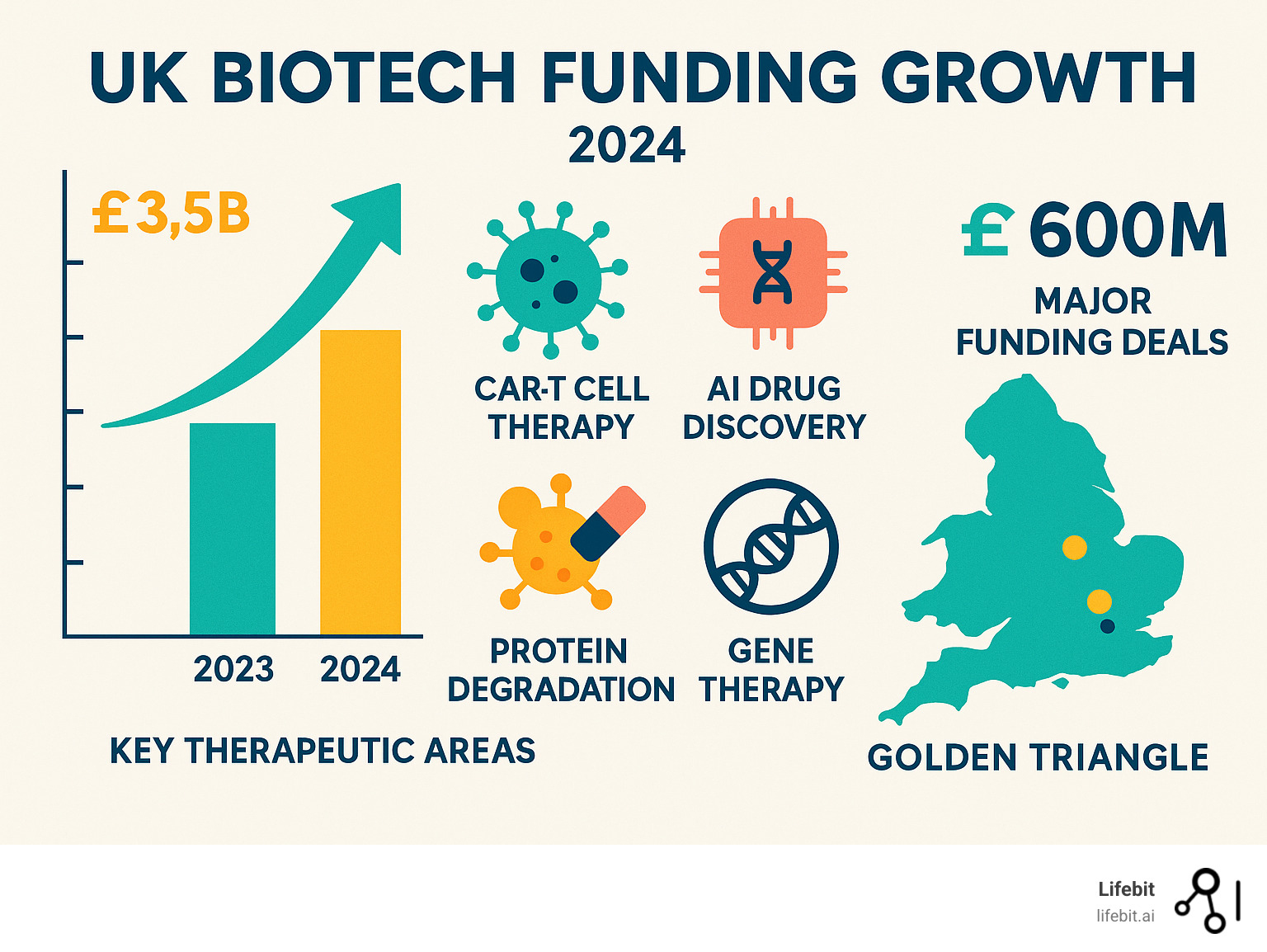From Lab to Life-Changing: A Guide to the UK’s Top Biotech Firms

Biotech Companies UK: Top 5 Pioneering Firms 2024
Why UK Biotech Companies Are Leading Global Innovation
Biotech companies UK represent one of Europe’s most dynamic life sciences ecosystems, with the sector raising a record £3.5 billion in 2024 – a remarkable 94% increase from the previous year. Here are the key facts about the UK biotech landscape:
Top UK Biotech Companies by Innovation:
- Autolus Therapeutics – CAR-T cell therapy pioneer with FDA-approved cancer treatment
- Bicycle Therapeutics – Bicyclic peptide platform with $555M in recent funding
- Isomorphic Labs – AI drug findy with multi-billion dollar pharma partnerships
- Amphista Therapeutics – Protein degradation with $1.25B milestone deal potential
- Evox Therapeutics – Exosome delivery platform worth up to $1.1B in partnerships
Key UK Biotech Hubs:
- Golden Triangle: London, Oxford, Cambridge (highest concentration)
- Scotland: Edinburgh, Glasgow, Dundee
- Other clusters: Manchester, Stevenage, Cardiff
The UK government’s £650 million ‘Life Sci for Growth’ package has further strengthened this momentum, positioning the country as the third-ranked nation globally for AI vibrancy in life sciences. From groundbreaking CAR-T therapies earning FDA approval to AI-powered drug findy platforms securing billion-dollar pharma collaborations, UK biotechs are translating cutting-edge science into real-world medical breakthroughs.
What sets the UK apart is its unique combination of world-class universities, robust regulatory frameworks, and a thriving investment ecosystem that spans from early-stage venture capital to major pharmaceutical partnerships. Companies are pioneering next-generation modalities including targeted protein degradation, exosome therapeutics, and AI-designed medicines.
I’m Maria Chatzou Dunford, CEO and Co-founder of Lifebit, where I’ve spent over 15 years working with biotech companies UK and globally to open up the power of genomic and biomedical data through federated AI platforms. My experience building computational tools and supporting precision medicine initiatives has given me deep insights into how UK biotechs are leveraging data and AI to accelerate drug findy and development.

The UK’s Thriving Biotech Ecosystem: A Look at the Landscape
The UK’s biotech scene is absolutely buzzing right now, and for good reason. We’re witnessing something quite remarkable – a perfect storm of world-class research, smart government backing, and investors who are genuinely excited about what’s happening here. This isn’t just growth; it’s a change that’s positioned the UK as Europe’s undisputed biotech champion.
What makes this ecosystem so special? It’s the way everything connects. Universities are spinning out groundbreaking companies, government policies are actually helping rather than hindering, and the funding landscape has become incredibly robust. The numbers speak for themselves – biotech companies UK raised a staggering £3.5 billion in 2024, nearly doubling the previous year’s investment.

The Golden Triangle and Beyond: UK’s Biotech Hubs
Everyone talks about the Golden Triangle, and honestly, it’s hard not to get excited about it. This powerhouse region connecting London, Cambridge, and Oxford isn’t just a geographical curiosity – it’s where some of the world’s most innovative biotech work happens daily.
Cambridge feels like biotech central sometimes. Walk around the science parks here, and you’ll bump into researchers from companies like Bicycle Therapeutics working on breakthrough cancer treatments. The University of Cambridge has been spinning out companies for decades, creating this incredible density of expertise and ambition.
Oxford brings its own magic to the mix. The university’s research prowess has given birth to companies tackling everything from rare diseases to novel drug delivery methods. There’s something inspiring about seeing centuries-old academic tradition driving cutting-edge science.
London ties it all together with its financial muscle and world-class hospitals. Companies like Autolus Therapeutics call London home, benefiting from proximity to both funding and the clinical expertise needed to test their innovations. The city’s diverse research institutes create opportunities you simply can’t find elsewhere.
But here’s what’s really exciting – the UK’s biotech story extends far beyond this famous triangle. Edinburgh has quietly become a serious player, with companies like Resolution Therapeutics pioneering new approaches to liver disease. Scotland’s biotech community might be smaller, but it punches well above its weight.
Manchester is making waves too, leveraging its strong university connections and growing reputation in medical technology. Meanwhile, the Stevenage Bioscience Catalyst represents something unique – a purpose-built ecosystem where early-stage companies can access everything from lab space to mentorship under one roof.
A Surge in Investment: Funding and Government Support
The funding landscape for biotech companies UK has been nothing short of extraordinary. That 94% increase in investment we mentioned? It’s not just a number – it represents real confidence in what UK biotechs are achieving.
We’re seeing some truly impressive funding rounds that show just how seriously investors are taking UK biotech. Bicycle Therapeutics raised $555 million in a single round. These aren’t just big numbers; they’re votes of confidence in the science and the teams behind it.
The government deserves real credit here too. The £650 million ‘Life Sci for Growth’ package isn’t just throwing money at the problem – it’s strategic investment designed to strengthen the entire ecosystem. From supporting R&D to developing infrastructure and nurturing talent, this funding creates the conditions for long-term success.
What’s particularly powerful is how academic-industry partnerships fuel this growth. Many of today’s leading biotech companies started as university spin-outs, built on breakthrough research from world-class institutions. These partnerships create a continuous pipeline of innovation, turning scientific findies into potential treatments for patients who desperately need them.
The venture capital community has noticed too. We’re seeing both domestic and international investors betting big on UK biotech, drawn by the combination of excellent science, supportive regulatory environment, and proven track record of successful exits.
Download the report on biopharma partnering priorities
Pioneering Progress: Top Biotech Companies UK is Championing
The UK’s biotech landscape sparkles with companies that aren’t just making scientific breakthroughs—they’re turning those breakthroughs into real treatments that save lives. These biotech companies UK are hitting major clinical milestones, securing game-changing partnerships with global pharma giants, and raising the kind of funding that makes headlines. Let’s explore the innovators who are putting the UK on the map as a global biotech powerhouse.

Autolus Therapeutics: Revolutionising Cancer Treatment with CAR-T
When London-based Autolus Therapeutics earned FDA approval for their CAR-T cell therapy, it wasn’t just a win for the company—it was a victory for patients facing one of the toughest cancers to treat. Their approved therapy, obe-cel (obecabtagene autoleucel), offers new hope to adults with relapsed or refractory B-cell precursor acute lymphoblastic leukemia.
What makes Autolus special is their approach to engineering T-cells. They take a patient’s own immune cells and reprogram them to become cancer-fighting machines. Their modular genetic programming approach gives doctors more precision and control than earlier CAR-T therapies, helping overcome some of the field’s biggest challenges.
The validation goes beyond regulatory approval. Blackstone Life Sciences has backed them with $70 million in milestone payments, while partnerships with Moderna and a collaboration agreement signal strong industry confidence. When you see companies like these betting big on Autolus, you know they’re onto something transformative.
Bicycle Therapeutics: A New Class of Oncology Drugs
Cambridge’s Bicycle Therapeutics has created something that sounds almost too good to be true: drugs that combine the precise targeting of antibodies with the manufacturing simplicity of small molecules. Their “bicycles” are synthetic peptides locked into a unique two-loop structure that can slip into places traditional drugs simply can’t reach.
Their lead candidate, zelenectide pevedotin, is making its way through clinical trials for hard-to-treat cancers. But what really catches the eye is how major pharmaceutical companies are lining up to work with them. Novartis signed a strategic collaboration in March 2023 to develop Bicycle radio-conjugates, followed quickly by a similar partnership with Bayer.
The $555 million private placement they secured in May 2024 speaks volumes about investor confidence. Across seven funding rounds, they’ve raised an impressive £673 million total. That’s the kind of financial backing that lets a company really push the boundaries of what’s possible in oncology.
Amphista Therapeutics: Next-Generation Protein Degradation
Cambridge-based Amphista Therapeutics is tackling one of medicine’s trickiest challenges: how to destroy disease-causing proteins that were once thought “undruggable.” Their targeted protein degradation platform uses “molecular glue” therapies to tag troublesome proteins for destruction, opening up new possibilities for treating cancer and neurological diseases.
Bristol Myers Squibb clearly sees the potential—they handed over a $30 million upfront payment and committed to up to $1.25 billion in performance milestones. When Amphista hit their first milestone in May 2023, it validated their innovative approach to protein degradation.
Their recent animal studies showed reduced tumor size and improved survival rates, marking a crucial step toward human trials. It’s exactly the kind of progress that gets the biotech world excited about new therapeutic possibilities.
Evox Therapeutics: Harnessing Exosomes for Drug Delivery
Oxford-based Evox Therapeutics is at the forefront of another revolutionary field: using exosomes as a natural delivery system for complex drugs. Exosomes are tiny vesicles that cells use to communicate with each other, essentially acting as the body’s internal postal service. Evox has engineered these exosomes to carry therapeutic payloads—like proteins, RNA, and small molecules—directly to target tissues, including the brain, which is notoriously difficult to reach.
Their proprietary DeliverEX™ platform allows for the precise targeting and loading of these natural nanoparticles, overcoming major challenges in drug delivery. This technology has immense potential for treating a wide range of conditions, from rare genetic disorders to neurodegenerative diseases.
The pharmaceutical industry has taken significant notice. Evox has secured major collaboration deals, including a partnership with Eli Lilly potentially worth over $1.1 billion, focused on developing RNA-based therapies for neurological disorders. They also have a long-standing collaboration with Takeda to develop protein replacement and mRNA therapies for rare diseases. These high-value partnerships underscore the industry’s belief that exosome-based delivery could be a game-changer for a new generation of medicines. With a strong pipeline and powerful technology, Evox is a key player in the UK’s advanced therapeutics landscape.
Guide Therapeutics: Gene Therapies for Blindness
Guide Therapeutics launched in 2023 with an audacious mission: curing rare blindness conditions. Based in London and Dublin, they’ve wasted no time making their mark. Their $170 million Series B funding round in 2024 was one of the year’s standout biotech raises.
Their lead candidate, AGTC-501, targets X-linked retinitis pigmentosa, a severe inherited retinal disease that gradually steals sight. When they dosed their first patient in a pivotal Phase 2/3 trial in June 2024, it marked a significant step toward bringing this potential cure to families who desperately need it.
Backed by leading investors like Syncona and Oxford Science Enterprises, Guide represents the kind of bold, patient-focused innovation that defines the best of UK biotech.
Resolution Therapeutics: Using Macrophages for Liver Disease
Edinburgh and London-based Resolution Therapeutics is taking a fascinating approach to treating chronic liver disease. Instead of traditional drugs, they’re using the power of macrophages—the immune system’s natural repair crew—to help damaged livers heal themselves.
Their lead program, RTX-001, focuses on chronic liver disease, a condition that often progresses to life-threatening liver failure. The £63.5 million Series B financing they closed in 2024 was one of the largest UK cell therapy fundraises to date, reflecting strong market confidence in their regenerative approach.
What’s particularly exciting about Resolution’s platform is how it taps into the body’s own healing mechanisms. Rather than fighting disease with synthetic compounds, they’re amplifying what immune cells already do naturally—repair tissue and reduce harmful inflammation.
The AI Revolution in UK Biotech
Artificial intelligence has moved from the field of science fiction into the heart of modern drug findy, and biotech companies UK are leading this change. What once took decades to accomplish is now happening in months, thanks to sophisticated AI algorithms that can process enormous datasets and spot patterns invisible to human researchers.

How AI is Accelerating Drug Findy
The impact of AI on drug development feels almost magical when you see it in action. Where researchers once spent years manually analyzing data, AI can now crunch through vast amounts of genomic, proteomic, and clinical information in hours.
Target identification has become dramatically more precise. AI algorithms can sift through complex biological data to pinpoint exactly which proteins or pathways to target for specific diseases. This means researchers can start their drug development journey with much higher confidence that they’re aiming at the right target.
Protein structure prediction represents perhaps the most exciting breakthrough. Tools like AlphaFold3 can now accurately predict how proteins fold into their 3D shapes – something that used to require expensive and time-consuming laboratory experiments. When you know exactly how a protein looks and behaves, designing a drug to interact with it becomes infinitely more precise.
Clinical trial design is getting smarter too. AI can analyze patient data to identify who’s most likely to respond to a treatment, predict potential side effects, and even simulate how a trial might unfold. This means fewer failed trials and faster paths to approval for promising therapies.
One particularly clever application is drug repurposing – using AI to find new uses for existing medications. Since these drugs have already passed safety tests, they can reach patients much faster than completely new compounds.
The UK’s strength in this area isn’t accidental. According to a Stanford report on AI vibrancy, the UK ranks third globally, reflecting our strong combination of research excellence, private investment, and patent activity. This foundation gives biotech companies UK a real competitive edge in the global race to develop life-saving treatments.
Spotlight on AI-Driven Biotech Companies UK Innovators
Some of the most exciting developments in AI-powered drug findy are happening right here in the UK, with companies that are genuinely changing how we think about developing medicines.
Isomorphic Labs stands out as perhaps the most ambitious AI drug findy company in the world. This Google DeepMind spin-off, based in London, helped develop the groundbreaking AlphaFold3 model that can predict protein structures with remarkable accuracy. The pharmaceutical industry has taken notice in a big way, with Isomorphic Labs securing strategic collaborations with both Eli Lilly and Novartis worth nearly $3 billion combined. This level of partnership from major pharma highlights the immense confidence in their AI-driven approach to drug design.
Ignota Labs, also based in Cambridge, has perhaps the most intriguing approach of all. They use AI to “rescue failed drugs” – analyzing why promising treatments didn’t work in clinical trials and finding ways to overcome those failures. Their recent $6.9 million seed funding will help advance their first rescued asset, a PDE9A inhibitor, into early clinical trials. It’s a brilliant concept that could open up the potential of countless abandoned therapies.
Another titan in this space is Oxford and Dundee-based Exscientia. As one of the first and most prominent AI drug discovery companies, Exscientia has built an end-to-end platform that automates and accelerates the entire drug design process. They have successfully taken multiple AI-designed molecules into clinical trials, a significant milestone for the field. Their approach combines generative AI with real-world experimental data to create novel drug candidates with optimized properties in record time. Exscientia has formed numerous partnerships with major pharma companies, including Sanofi, Bristol Myers Squibb, and GSK, demonstrating the broad applicability and validation of their AI-first methodology. Their work is a testament to the UK’s leadership in applying computational power to solve complex biological problems.
These companies showcase how UK innovators aren’t just using AI to make incremental improvements – they’re fundamentally reimagining how we find and develop new medicines. The result is a faster, more efficient path from laboratory bench to patient bedside.
Frequently Asked Questions about UK Biotech
When exploring the landscape of biotech companies UK, many people have similar questions about how this thriving ecosystem works. Let me walk you through the most common queries we hear, drawing from my experience working with these innovative companies.
What are the main biotech clusters in the UK?
The heart of UK biotech beats strongest in what we call the ‘Golden Triangle’ – the interconnected region spanning London, Oxford, and Cambridge. This powerhouse area hosts an incredible concentration of world-class universities, cutting-edge research institutions, and innovative companies all working together.
What makes this triangle so special? It’s the perfect storm of academic excellence and commercial opportunity. Universities like Oxford and Cambridge have been spinning out groundbreaking biotech companies for decades, while London provides unparalleled access to finance and global markets. The synergy between these three cities creates an ecosystem where ideas can quickly transform into life-changing therapies.
But the UK’s biotech story doesn’t end there. Edinburgh has emerged as a major player, particularly in cell therapies and regenerative medicine – companies like Resolution Therapeutics are proving that Scottish innovation can compete on the global stage. Meanwhile, Manchester is building a strong reputation in diagnostics and infectious disease research, leveraging its robust university partnerships.
Don’t overlook Stevenage either. Home to a major bioscience campus, this area represents a unique collaborative model where early-stage companies can access shared facilities and expertise. It’s particularly attractive for companies that want to be close to major pharmaceutical research sites.
These diverse geographical clusters work together beautifully, each bringing their own strengths to create a truly robust national biotech landscape.
What technologies are UK biotech companies focusing on?
Biotech companies UK are pushing boundaries across some of the most exciting areas of modern medicine. What strikes me most is how these companies aren’t just following trends – they’re creating them.
Cell and gene therapies represent a huge focus area. We’re seeing incredible advances in CAR-T cell therapies, like those developed by Autolus Therapeutics, which literally reprogram patients’ immune systems to fight cancer. Macrophage-based treatments are another fascinating development, with companies exploring how these immune cells can repair damaged tissues.
AI-driven drug findy is absolutely changing how we develop medicines. Companies like Isomorphic Labs are using artificial intelligence to predict protein structures and design drugs with unprecedented precision. This isn’t just faster – it’s fundamentally changing what’s possible in drug development.
Targeted protein degradation represents a completely new approach to treating disease. Instead of just blocking problematic proteins, companies like Amphista Therapeutics are developing ways to eliminate them entirely. It’s like having a molecular recycling system inside cells.
We’re also seeing remarkable innovation in advanced biologics. Bicycle Therapeutics’ bicyclic peptides combine the best features of antibodies and small molecules, while other companies are perfecting antibody-drug conjugates that can deliver treatments directly to diseased cells.
The breadth of innovation happening across these technologies shows just how dynamic the UK biotech scene has become.
How is the UK government supporting the biotech sector?
The UK government has really stepped up to support biotech innovation, and the results speak for themselves. The centerpiece of this support is the impressive £650 million ‘Life Sci for Growth’ package announced in 2023, which demonstrates a serious commitment to keeping the UK at the forefront of global life sciences.
This isn’t just about throwing money at the problem, though. The government has created a comprehensive support system that addresses multiple challenges facing biotech companies UK. Generous R&D tax credits make it more attractive for companies to invest in research and development, while streamlined regulatory pathways help get innovative treatments to patients faster.
What I find particularly encouraging is the focus on infrastructure and talent development. The government recognizes that having world-class facilities and skilled researchers is essential for long-term success. They’re also working to make clinical trials more efficient and cost-effective, which is crucial for smaller biotech companies with limited resources.
The impact of this support is clear in the numbers – the sector raised £3.5 billion in 2024, a 94% increase from the previous year. When you combine government backing with strong academic institutions and private investment, you create an environment where innovation can truly flourish.
This strategic approach reinforces why the UK remains one of the top global destinations for life sciences investment and development.
Conclusion
The future of healthcare is being written right here in the UK, and biotech companies UK are the authors of this extraordinary story. From the busy laboratories of Cambridge to the innovative hubs of Edinburgh, we’re witnessing a remarkable change in how medicines are finded, developed, and delivered to patients who need them most.
What makes the UK’s biotech ecosystem so special isn’t just the impressive £3.5 billion raised in 2024 or the groundbreaking FDA approvals. It’s the unique blend of world-class universities, visionary entrepreneurs, and supportive government policies that creates an environment where scientific dreams can become life-changing realities.
The integration of AI into drug findy is perhaps the most exciting development we’re seeing. Companies like Isomorphic Labs are using artificial intelligence to predict protein structures with unprecedented accuracy, while others are rescuing previously failed drugs and identifying new therapeutic targets. This technological revolution promises to make drug development faster, more precise, and ultimately more successful.
But innovation means nothing without the right support system. The UK government’s £650 million ‘Life Sci for Growth’ package demonstrates a real commitment to nurturing this sector. Combined with the strong venture capital ecosystem and the close partnerships between academia and industry, it’s clear that the UK is building for long-term success.
At Lifebit, we’re honored to be part of this incredible journey. Our federated AI platform helps researchers and organizations across the globe access and analyze biomedical data securely and efficiently. We believe that the best findies happen when brilliant minds can collaborate seamlessly, sharing insights while protecting privacy and maintaining compliance.
The pipeline of innovation flowing from biotech companies UK is stronger than ever. From CAR-T therapies that are revolutionizing cancer treatment to AI-powered platforms that are accelerating drug findy, the next decade promises to bring treatments for diseases that have long seemed untreatable.
The journey from laboratory bench to patient bedside is never easy, but with the collective expertise, passion, and determination we see across the UK’s biotech landscape, we’re confident that the future of medicine has never looked brighter.
Learn more about Lifebit’s Trusted Research Environment

